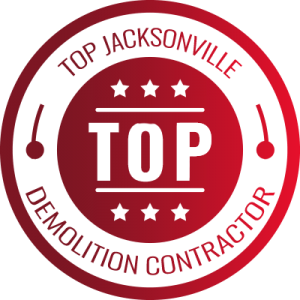



Commercial demolition clears out what’s no longer needed so something new can take its place. In Jacksonville, this might mean removing an outdated retail center, clearing an old office building, or getting a property ready for a new warehouse. These projects call for careful planning from start to finish, not just for safety but to stay on track with state and local rules. Commercial demolition in Jacksonville involves more than just knocking down buildings. It means working with city schedules, dealing with utility lines, and making sure things move fast and smooth.
Every job is unique, but our steps are steady, so clients know what to expect. Each phase, from our first meeting to our final cleanup, follows a clear plan.
Initial Planning and Site Evaluation
A typical project starts with a call about a property that’s no longer needed. We set up a meeting and walk through the site to look at the structure, the schedule, and what stays or goes. Some jobs involve tenant changes. Others mean redeveloping a spot that hasn’t seen updates in years. Common locations in Jacksonville include Arlington, San Marco, and retail zones by main roads. These range from single-tenant spaces to business centers with multiple buildings.
During the site walk, we pay close attention to equipment access points, nearby structures, and areas that might be in use or need to be preserved. This step shapes everything that comes next. Notes from the visit help design a plan, so nothing gets missed.
We also check if the site has construction materials like steel and concrete or features like loading docks. Knowing what is present helps us bring the right equipment and follow all city disposal standards.
Permitting and State/Local Requirements
Once we know the scope, we dive into permits. Jacksonville and Duval County have their own applications for demolition. We gather facts like property lines, the height and square footage of the building, and check which utilities are still active. Information from county records and visual inspections is double-checked to match the current site.
After forms are submitted, we follow up with city departments and keep our clients updated about timelines and inspections. If the building is older, extra reviews might be needed for asbestos or protected historical features. We raise these points right away to avoid any delays later.
Our staff are used to handling city inspections and can coordinate with utility providers for shutdown confirmations and safety checks. Because commercial properties often involve higher permits and stricter rules than residential sites, our team is always ready to address anything that comes up.
Pre-Demolition Prep and Safety Steps
Before we bring equipment onsite, we set up the safest work zone possible. This means contacting utility companies to shut off power, water, gas, and even telecom if needed. Every utility disconnect goes through official inspections and is checked off with signed approvals to follow local laws. Skipping these steps isn’t an option.
Next come boundaries that protect nearby businesses, sidewalks, roads, and even parking lots. Barriers such as fencing, caution tape, and temporary signage keep pedestrians away and control foot and car traffic close to the job. For busy intersections or roads, we may need road use approvals from the city and help managing any temporary access changes.
We carefully plan where equipment will enter and exit, where debris will be collected, and how trucks will move in and out. Most of the heavy lifting takes place during weekday hours to avoid noise issues or traffic problems. By mapping everything in advance, we help prevent delays and keep things moving on schedule.
Demolition Methods and Site Work
Once prep is done, the real demolition starts. Jacksonville’s commercial spaces often need a mix of equipment, like excavators, concrete crushers, and loaders. For shopping centers and warehouses, mechanical demolition handles larger areas quickly. If it is an office with more framing, we sometimes remove parts in smaller sections, moving layer by layer.
Indoor demolitions, such as strip mall interiors or medical offices, might start with hand tools to remove finishes before machines come in. As the work progresses, our crew manages each part in phases. This means clearing one area as another is coming down, staying coordinated with the rest of the site.
We handle all debris according to city regulations, separating recyclable steel, concrete, and other materials. Large steel beams and concrete slabs are broken down on-site with specialized attachments, so hauling is efficient and safe. Every step follows Jacksonville’s requirements to avoid penalties and stay environmentally responsible.
Communication on site is constant. We use radios and site boards to make sure everyone knows the current job stage. Safety stops are frequent, especially if neighboring properties are close or if the structure is connected to a shared wall.
Elev8 Demolition is licensed and insured for commercial work and trained for all state and city safety measures. Working with trained operators and spotters helps keep people, vehicles, and buildings protected at every stage.
After the Demolition: Cleanup and Next Steps
When demolition is done, the cleanup phase begins. Loose debris is gathered up, surfaces swept, and light grading is done to keep the area level. If it’s required, we can rough grade a site to help with water drainage and stop future erosion.
Some properties are cleared for quick construction starts. Others stay vacant and need clear documentation and regular maintenance until work begins. After cleanup, we do a walkthrough with the client to confirm all debris is removed and that the area meets property boundaries. Any fencing, equipment, or temporary barriers are taken down so the lot is ready for its next use.
All materials hauled away go to approved local disposal or recycling facilities, as required by city code. Larger projects usually require multiple debris hauls. Since our hauling trucks are sized for commercial debris, jobs with heavy concrete or steel are handled in fewer trips for faster site turnover.
What to Expect From a Smooth Commercial Demo in Jacksonville
A successful commercial demolition in Jacksonville follows a straight path from start to finish. We begin with site visits, move into permitting with local offices, organize prep that covers all safety and utility points, handle demolition, then finish with a full cleanup so the property is construction-ready.
Clarity upfront keeps each phase easy to follow. Permitting and inspections can change your schedule if not handled early, and disconnected utilities are key to keeping workers safe before the first wall comes down. Our step-by-step approach prevents missed details—whether it’s coordinating utility shutdowns, working around active business zones, or meeting city disposal requirements.
Commercial demo projects are rarely simple, but a steady plan makes them predictable. Good communication, honest scheduling, and regular project updates leave clients confident at every stage. That’s how you avoid downtime, control costs, and make space for the new plans ahead.
When a Jacksonville property needs full or partial removal before new construction, we bring a clear plan and steady process from the first walkthrough to the final sweep. We manage each step with care, keeping safety, timing, and compliance at the center of everything we do. Whether the site is along a busy road or tucked into a smaller lot, our crew stays focused from start to finish. Take a closer look at how we approach commercial demolition in Jacksonville and what to expect next.

